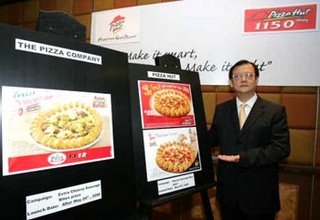 A Thai pizza company CEO demonstrates that his product is the same as Pizza Hut. Asian cultures tend to imitate rather than innovate. Hanoi in North Vietnam has no fewer than seven ‘Prince’ Hotels, for instance. The hope is that by copying the name of a successful enterprise, their own hotel will somehow also 'acquire the merit'. True originality is relatively rare.
A Thai pizza company CEO demonstrates that his product is the same as Pizza Hut. Asian cultures tend to imitate rather than innovate. Hanoi in North Vietnam has no fewer than seven ‘Prince’ Hotels, for instance. The hope is that by copying the name of a successful enterprise, their own hotel will somehow also 'acquire the merit'. True originality is relatively rare. Thailand’s King Bhumibol addresses the new Cabinet Ministers. For several generations, the Rama dynasty of monarchs has sought to “westernize” Thailand, even to the point of giving the country a name which most of its citizens cannot accurately pronounce. Note also that the King is wearing a western suit.
Thailand’s King Bhumibol addresses the new Cabinet Ministers. For several generations, the Rama dynasty of monarchs has sought to “westernize” Thailand, even to the point of giving the country a name which most of its citizens cannot accurately pronounce. Note also that the King is wearing a western suit.Gross Domestic Product is a cold, meaningless and flawed idea whose time has passed. So what if we’re told that Australia produced $20 billion dollars worth of goods and services in 2006? These figures are cobbled together by accountants employed by the wealthy corporate fat-cats, whose inevitable political sub-agenda includes broadcasting the ‘feel-good’ factor. People supposedly feel good if some attractive news-reader tells us our collective wealth has risen by 4.2% this year. So we all continue to Believe, doggedly carrying on working every day, mainly in order to pay the electricity bill, $7.50 per kilo for tomatoes… and then the tax-man cometh.
In reality, it is the wealthy who scoop up the bulk of any increase in wealth. Although it’s beginning to sound like a mantra chanted by the Looney Liberal Left, the familiar catch-cry The Rich are Getting Richer is still quite true: in fact, the U.N's very own Report on Poverty (2005) says so.
Logically, that can only happen at the expense of the Poor: a bucket can only contain so much water. It’s called Global Capitalism, the largest economic lie ever perpetrated on the world since its equally ugly predecessor, Colonial Imperialism, was discredited. Hey, the Industrial Revolution ain’t over yet, folks – keep your powder dry.
[ Stage Whisper: "Are you wearing any clothing labeled ‘Made in China"? ].
Never forget that GDP includes expenditure on “Oh No!” items like lawyers’ fees, costs of replacing vandalized windows and locks after a break-and-entry, insurance premiums, interest on credit cards, traffic fines, etc… items which add little value to our happiness, and arguably might even increase personal stress.
No. Uh-uh. Wrong Way – Go Back. What matters far more is the individual’s feelings of well-being and state of mind. So why not supplement and counter-balance those meaningless GDP figures with GDH: a basket of indicators measuring "Gross Domestic Happiness". Measuring it precisely could be trickier, but statisticians are capable of measuring anything, and that includes ‘Truths’… if they decided to set their minds to it and consult social scientists.
Thailand’s revered King Bhumibol is right onto the scent of GDH with his model of the Sufficiency Economy. He has wisely cautioned Thais about the pitfalls of the mainstream Western development model which has been pursued by many developing nations around the world, including Thailand, over the past several decades. It’s the very last thing the current american FTA negotiators want to hear at this delicate stage of their arm-twisting process.
The King only ever ‘suggests’ in broad terms – he doesn’t make specific ‘commands’. He’s suggested that Thailand could beneficially think ‘outside the square’ and review its development habits. The King’s Sufficiency model could provide more sustainable economic growth and boost people’s happiness. He aligns his thinking with the Buddhist ‘Middle Path’ concept.
Never forget that GDP includes expenditure on “Oh No!” items like lawyers’ fees, costs of replacing vandalized windows and locks after a break-and-entry, insurance premiums, interest on credit cards, traffic fines, etc… items which add little value to our happiness, and arguably might even increase personal stress.
No. Uh-uh. Wrong Way – Go Back. What matters far more is the individual’s feelings of well-being and state of mind. So why not supplement and counter-balance those meaningless GDP figures with GDH: a basket of indicators measuring "Gross Domestic Happiness". Measuring it precisely could be trickier, but statisticians are capable of measuring anything, and that includes ‘Truths’… if they decided to set their minds to it and consult social scientists.
Thailand’s revered King Bhumibol is right onto the scent of GDH with his model of the Sufficiency Economy. He has wisely cautioned Thais about the pitfalls of the mainstream Western development model which has been pursued by many developing nations around the world, including Thailand, over the past several decades. It’s the very last thing the current american FTA negotiators want to hear at this delicate stage of their arm-twisting process.
The King only ever ‘suggests’ in broad terms – he doesn’t make specific ‘commands’. He’s suggested that Thailand could beneficially think ‘outside the square’ and review its development habits. The King’s Sufficiency model could provide more sustainable economic growth and boost people’s happiness. He aligns his thinking with the Buddhist ‘Middle Path’ concept.
As a consequence, the new post-Thaksin interim government, led (with the King’s blessing) by Coup leader Gen. Surayud, looks set to place a lower priority on GDP growth. Instead, they will focus on the quality of growth so that income is more equally distributed among the entire population. Fat-cat multi-national CEOs won’t approve of that... in fact, Bush has already criticised the coup. But the King is actually considering the welfare of his people - all his people – unlike CEO Thaksin. Already the liquor laws are changing, and the conditions of longer-term Visas have become more demanding (and expensive) in order to cleanse the Kingdom of dirt-poor scumbag foreigners.
The King’s plan does not imply any sort of Maoist Year-Zero regression to an inward-looking agrarian self-sufficiency. On the contrary, it still fosters both foreign and internal investment, but simply avoids biting off more than it can chew. It seeks to avoid putting too much air too quickly into its bubble – as happened in the 1997 financial meltdown. For instance, only one or two of Bangkok’s ten Skytrain extension lines proposed by the previous Thaksin administration will be commenced this year.
Simple arithmetic agrees. If a country’s economy is force-fed to grow at 5% every year, it would be more than 100% bigger in 20 years, due to the exponential factor. Growth like this? …at a time when populations are shrinking? Hardly. To keep up such relentlessly increasing pace implies, for example, that each household would eventually be wanting to buy two washing machines instead of one. Clearly, that’s unsustainable rot – and undesirably wasteful consumption - in the longer run. And how would these GDP figures look in fifty years from now, especially if more of the so-called ‘developing’ countries also begin to reduce population growth, as we have already done in the Far West?
Singapore, for example, already has a low birth rate of only 1.3 babies per woman, compared to the minimum ‘replacement’ rate of 2.1 babies. Even more extreme is China’s disastrous One Child Policy and associated female infanticide, doing a lethal dance with its current explosive 10% (!) growth rate. Talk about shooting yourself in the foot. In economic terms, it’s tantamount to an “own goal”. That factor alone will determine the economic fate of China in the not too distant future. In the race to become the post-USA superpower, the score-line may well soon read:
Simple arithmetic agrees. If a country’s economy is force-fed to grow at 5% every year, it would be more than 100% bigger in 20 years, due to the exponential factor. Growth like this? …at a time when populations are shrinking? Hardly. To keep up such relentlessly increasing pace implies, for example, that each household would eventually be wanting to buy two washing machines instead of one. Clearly, that’s unsustainable rot – and undesirably wasteful consumption - in the longer run. And how would these GDP figures look in fifty years from now, especially if more of the so-called ‘developing’ countries also begin to reduce population growth, as we have already done in the Far West?
Singapore, for example, already has a low birth rate of only 1.3 babies per woman, compared to the minimum ‘replacement’ rate of 2.1 babies. Even more extreme is China’s disastrous One Child Policy and associated female infanticide, doing a lethal dance with its current explosive 10% (!) growth rate. Talk about shooting yourself in the foot. In economic terms, it’s tantamount to an “own goal”. That factor alone will determine the economic fate of China in the not too distant future. In the race to become the post-USA superpower, the score-line may well soon read:
India 2 China 1
Even the Thai media are discussing Thailand's ‘greying’ population, but there’s still a high enough proportion of young people here. Not so in Australia, sadly, which desperately needs to invite anyone (refugees are an excellent bet) in order not to lag behind in the numbers game.
Global Capitalism’s place in History will be seen as a relatively short-term injection of economic steroids. As with any steroid, there are disproportionately destructive long-term after-effects. That’s beginning to happen already, given the situation with Oil and energy needs. Blind Freddie can see that coming. Certainly the Thai King can. Perhaps now the world can look to Thailand and learn about prioritising and preserving Happiness.
Global Capitalism’s place in History will be seen as a relatively short-term injection of economic steroids. As with any steroid, there are disproportionately destructive long-term after-effects. That’s beginning to happen already, given the situation with Oil and energy needs. Blind Freddie can see that coming. Certainly the Thai King can. Perhaps now the world can look to Thailand and learn about prioritising and preserving Happiness.





Trying to take a cool, realistic look at the implications of cheap bulk energy starting to get ever-more expensive, Thailand looks to me to be 'a most favoured nation'.
ReplyDeleteIt has a relatively low population, can grow a surplus of food, and can house its people cheaply (no winter-heating bills).
We live in Northeastern Thailand and already practise semi-sufficiency. I drove our battered 30-year-old Toyota pickup (the 'motorised wheelbarrow', not the 'block of gold' Chevy Colorado) home yesterday with a ton of rice on it. That is half the crop from our bit of land, where a family of landless farmers do all the hard work of growing the rice in return for the other half of the crop.
I ought to add to GDP by running an on-line course "Modern Peasantry 101", but am enjoying the serenity too much to bother.
Q.E.D. I rest my case, Martin. Your scenario is Exhibit A. Brilliant. When diesel is too dear, it'll be the ol' A-Frame back-packs full of rice, I suppose, but you'll still be much better placed than we town-mice. All our Chevvy Colorados might make reasonable places to sleep if turned upside-down. When your Toyota next ventures to the big smoke (AKA Chiangmai), drop in and we'll share some chaa.
ReplyDelete